Hey Everybody,
I decided to imagine that I’m going to teach a class on Stage Makeup.
What does my imaginary class look like?
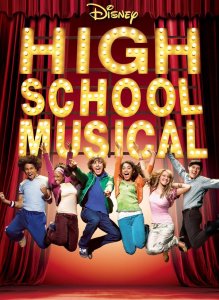 My class in comprised of 11th-12th grade students. I would like to believe that they all have taken the theatre history course and remember everything form it. I know that realistically that wont be the case. Most of them probably didn’t and of those who didn’t probably don’t remember too much of it. As much as I would like to, I can’t assume that every student has some stage experience (some might be backstage people).
My class in comprised of 11th-12th grade students. I would like to believe that they all have taken the theatre history course and remember everything form it. I know that realistically that wont be the case. Most of them probably didn’t and of those who didn’t probably don’t remember too much of it. As much as I would like to, I can’t assume that every student has some stage experience (some might be backstage people).
What texts would I give them?
One of the first texts I’d give them would be this article on Stage Makeup V. Regular Makeup.
“Stage Makeup vs. Regular Makeup.” Frankels Costume RSS. N.p., n.d. Web. 28 July 2016.
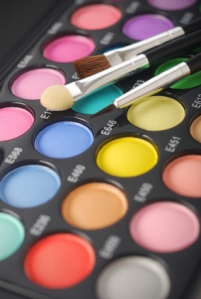
This article compare and contrast stage makeup verses regular makeup or everyday makeup.
According to storytoolz the quantitative assessment of this text is grade 10. I would agree. My qualitative assessment the organization of text structure is slightly complex. There is clear sections that are labeled with questions and in those sections that question is answered. Like in the section “Can stage makeup be for everyday use?” the author give us the answer as well as an explanation to support the answer. The subject matter knowledge demands are moderately complex. This text requires some previous knowledge on both stage makeup and regular makeup. This is evident in this passage; ” Most often, everyday makeup is simply used to hide blemishes or flaws and highlight one’s natural beauty. Stage makeup can be used for dramatic effects and tends to be much heavier than everyday makeup.”
Some vocab that I might need some instructional support is:
- Regular Makeup
- Heavier
- Lighter
- Texture
- Pigment
- Highlighting
Even though this text is grade 10 level I would use it in my 11th – 12th grade classroom by asking them to have a discussion about the differences between stage makeup and everyday makeup with only this article and their previous knowledge.
I would use these question to get them thinking and to guide the discussion:
What’s different between the two?
Why are they different?
The next would probably to show them part of or all of this video by the Central Pennsylvania Youth Ballet on Basic Stage Makeup techniques.
CentralPAyouthballet. “CPYB Presents Basic Stage Makeup.” YouTube. YouTube, 05 Dec. 2013. Web. 28 July 2016.
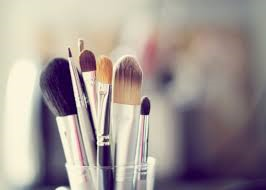 They go through basic techniques of how to apply stage makeup for a teenage girl, a young man, and a young girl.
They go through basic techniques of how to apply stage makeup for a teenage girl, a young man, and a young girl.
Storytoolz gave this text a 9.4 quantitate assessment. I’m not sure I agree I think middle schoolers would be able to follow this video. I feel that the qualitative assessment points to a slightly lower score. It’s meaning or purpose is slightly complex as it’s clearly stated in the beginning and theme is obvious. The speaker, Paige, says in the beginning of the video, “Our topic today is basic stage makeup. We will talk about how to apply to make up and why we wear it in the first place.” The Organization is also slightly complex as the instructions and steps are very easy to follow and clear. The also do a good job of following chronological order. Paige says, “next up is powder” when moving from step one to two.
Some vocab that might need some instructional support is:
- Base
- Sponge
- Pigmentation
- Tones
- Highlighting
- Contouring
I would use this video to show them the basics before having them do it themselves, or even do it along with the video.
A question I might ask them to think about during this video would be:
Why do you use each product?
I would then give them this article on a professional makeup artist.
“Help and Advice for Your Creative Career.” Make-up Artist for Theatre. N.p., n.d. Web. 28 July 2016.
Find out what it’s like to work in makeup professionally, by an interview of the artist in charge of the Lion King in the UK.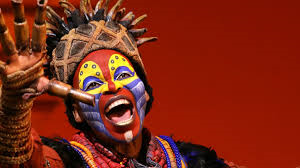
I would then probably go into a unit on world theatre and their makeup techniques. To go along with that I would include this article on Kabuki theatre (a form of Japanese theatre)make up.
“The Story behind the Faces.” The Story behind the Faces. N.p., n.d. Web. 28 July 2016.
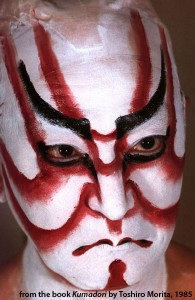 This text gives a brief overview of what Kabuki Theatre is. It also explains why and how Kabuki actors use makeup.
This text gives a brief overview of what Kabuki Theatre is. It also explains why and how Kabuki actors use makeup.
I think Storytoolz couldn’t decided what grade level to give this text for Quantitative assessment. I imputed different sections of this text and got a rage of grade levels. Anywhere from 11.4 to 43. I think Storytoolz kept giving me high grade levels because it has a lot of Japanese words in the text, but I feel the author gives does a good job of translating those words. I think using the Qualitative measures it brings it down to a 11th to 12th grade level. The subject matter knowledge demands are somewhere between very and exceedingly complex. This would be because it requires the reader to have an understanding what Kabuki theatre is, as well as an idea of Japanese culture and geography. This is shown in this sentence form the article,” In the Edo region of Japan in 1673, a fourteen-year-old actor named Ichikawa-Danjuro I invented a Kabuki performance style called the Aragato, or the “wild show” The Vocabulary is Very Complex. There are words that are unfamiliar and subject specific. This is show in this excerpt, “We can glimpse a direct link between the famous makeup for the samurai hero of the Aragato style of Kabuki and the ancient use of makeup in rituals pertaining to spirit worship and shamanic possession, for the samurai’s ability to do the impossible is understood to be because they have allowed themselves to be possessed by a powerful kami (“supernatural deity”) and thus have become hitokami (“man-gods”) and a functionality of any extravagant transformational makeup like this is to generate the suspension of disbelief in the audience so that they can accept the convention that they are in the presence of supernatural beings during the performance (just think of the way Hollywood movies use CGI today to make us believe we are on another planet watching blue aliens run through strange forests for the modern version of this age-old concept).”
Some Vocabulary that might need some instructional support:
- Kabuki Theatre
- Epics
- Masking
- Kumadori Makeup
- Samurai
- Shamanic/shaman
- Suji-Kuma
- Noh
Even if this is a complex text I would give it to my 11th- 12th graders, because I wouldn’t use it by it’s self. I would use this or parts of it to explain how different cultures use makeup in theatre.
A question to think about during the reading:
How does the Japanese use makeup differently then we do?
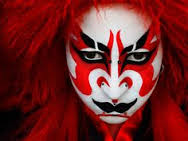 An example of what I would pair it with, would be this video to help understand it a little better.
An example of what I would pair it with, would be this video to help understand it a little better.
KyonDimble. “Kabuki – Making Of.” YouTube. YouTube, 2012. Web. 28 July 2016.
A how to video on Kabuki makeup.
During the course of the semester I would touch on pop culture and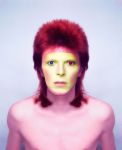 famous artist who use make up in their performance. An example would be this article about David Bowie.
famous artist who use make up in their performance. An example would be this article about David Bowie.
“David Bowie’s On-Stage Makeup Routine.” Into The Gloss. N.p., n.d. Web. 28 July 2016.
David Bowie talks about what makeup he uses and how he uses it.
The last unit would be all about blood and gore. Like my last post (How to Make Fake Cuts) or this video from arts edge on how to make blood you can eat.
 “The Kennedy Center: ARTSEDGE – the National Arts and Education Network.” ARTSEDGE: Blood, Guts, and Gore: Stage Makeup and Special Effects. N.p., n.d. Web. 28 July 2016.
“The Kennedy Center: ARTSEDGE – the National Arts and Education Network.” ARTSEDGE: Blood, Guts, and Gore: Stage Makeup and Special Effects. N.p., n.d. Web. 28 July 2016.
Make fake edible blood.
These text include a verity of topics with in stage makeup and I think that they can all be used in some capacity.
Hope you enjoyed my little trip to the future.
See you next time!
Becca, you do an excellent job of explaining the text complexity of these texts and why you would use each text. I’m curious which of these texts you might use to pull in students that are not already fans of theater and stage make-up?
LikeLike
Hi Becca. Really interesting topics. I especially like the writing about the Kabuki Theater. Japan is my favorite country, so it was really fun for me to read about. Cheers!
LikeLike
Becca, I like how you considered the reader and thee context when giving a final assessment of appropriate grade level for your texts.
LikeLike
Very interesting!
LikeLike